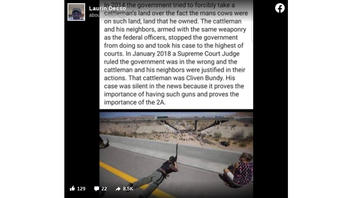
Was cattleman Cliven Bundy unfairly forced off his own land by federal agents in 2014, and then vindicated in court because he was justified in his actions? No, that is not true. Bundy owed the government more than $1 million for 21 years of grazing his herds on land belonging to the U.S. Bureau of Land Management. Then Bundy and his sons won a court case on a technicality, not because they were innocent of charges.
The claim appeared in a post published on Facebook on April 21, 2019, (archived here) with the following text:
In 2014 the government tried to forcibly take a cattleman's land over the fact the mans [sic] cows were on such land, land that he owned. The cattleman and his neighbors, armed with the same weaponry as the federal officers, stopped the government from doing so and took his case to the highest of courts. In January 2018 a Supreme Court Judge ruled the government was in the wrong and the cattleman and his neighbors were justified in their actions. That cattleman was Cliven Bundy. His case was silent in the news because it proves the importance of having such guns and proves the importance of the 2A.
This is what the post looked like on Facebook at the time of writing:
This post contains four mistakes. Foremost, Cliven Bundy was not grazing his herds on his own land but on taxpayer-owned land, under the purview of the U.S. Bureau of Land Management in Clark County, Nevada, where grazing fees are assessed. He owed more than $1 million. The government's full case can be found here.
Second, Bundy and his neighbors did not stop federal officers from arresting him. There was an armed standoff, but he was taken into custody. He and three others were charged with threatening a federal officer, carrying and using a firearm on federal land and engaging in conspiracy. The other three defendants were his sons Ryan and Ammon Bundy and their friend Ryan Payne. More defendants were added and brought to other trials after the Bundys called in neighbors and friends to join them.
Third, the case was not dismissed by a single judge of the highest court. The highest court would be the U.S. Supreme Court, and in their courtroom is in Washington, D.C., where nine justices hear a case. The Bundy case went before U.S. District Court in Las Vegas.
Bundy was not acquitted or found innocent. Chief U.S. District Judge Gloria Navarro did not rule he and his co-defendants were legally in the right. Rather, she ruled that prosecutorial misconduct had occurred and charges were dropped. According to The Los Angeles Times, Navarro rebuked federal prosecutors -- using the words "flagrant" and "reckless" to describe how they withheld evidence from the defense -- before saying "that the universal sense of justice has been violated" and dismissing the charges. Namely, Navarro explained that federal prosecutors had failed to disclose information from cameras recording video from the standoff and the presence of federal snipers around the Bundy Ranch.
Fourth, the ongoing Bundy cases were hardly "silent in the news." The story was reported by newspapers, radio and television from coast to coast.
The Bundys gained national notoriety and stayed in the news for years. PBS' Frontline program aired a special about the Bundys and other defendants.
The New York Times allotted daily space to the Bundy story culminating with trial coverage of seven co-defendants acquittal by jury in October 2016.
Bundy came to the attention of The Southern Poverty Law Center in Alabama, which described Bundy's views as closely aligned with those of the Posse Comitatus organization.


















